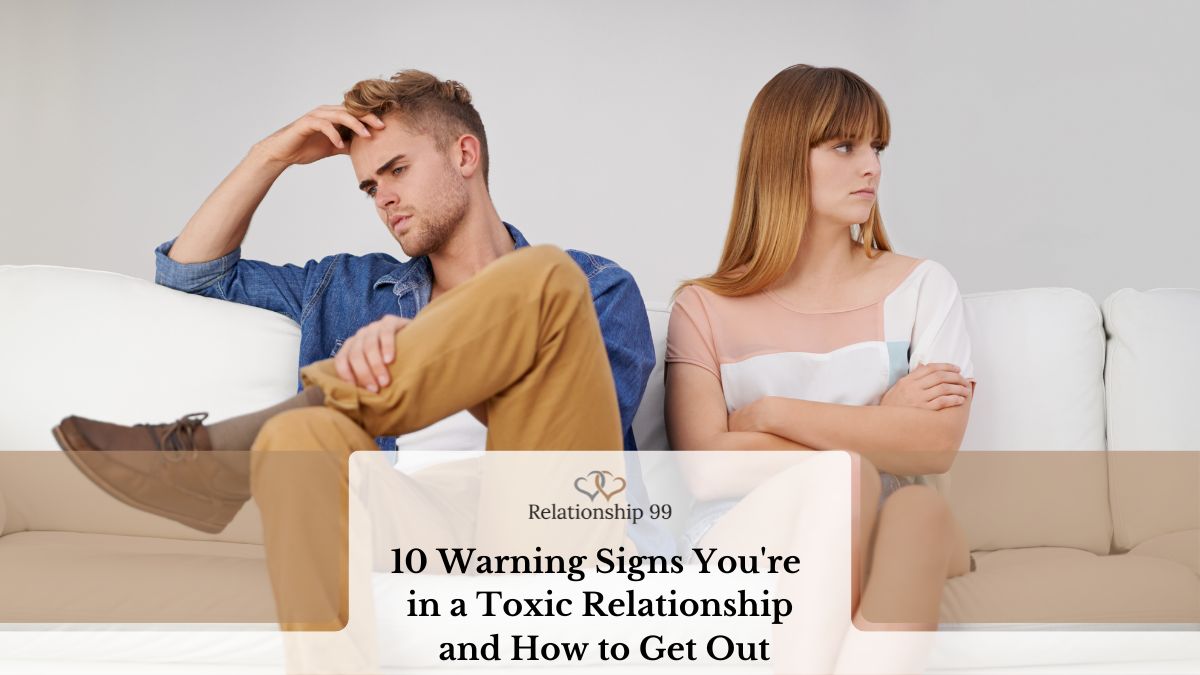Relationships are an important part of our lives. They bring us joy, comfort, and support. However, not all relationships are healthy, and some can be toxic. Toxic relationships can be damaging to one’s mental and emotional well-being, often causing long-term effects. So, how do you know if you’re in a toxic relationship? In this blog, we’ll go over ten warning signs to look out for and offer advice on how to get out of such relationships.
1.Constant Criticism
Criticism is a normal part of any healthy relationship, but when it becomes constant and demeaning, it can be a sign of toxicity. In a toxic relationship, one partner may constantly criticize the other’s appearance, behavior, or even thoughts and feelings. This can eventually lead to low self-esteem and feelings of worthlessness.
2.Lack of Trust
Trust is a crucial component in any relationship. However, in a toxic relationship, there may be a lack of trust or constant suspicion. One partner may constantly check the other’s phone, question their whereabouts, and make accusations without any valid reason. They may also try to control who the other person talks to or hangs out with. This lack of trust and control can be a major red flag.

Control and Manipulation
Toxic relationships often involve one partner trying to control the other’s actions, thoughts, and feelings. This can range from controlling what they wear and who they talk to, to manipulating them into doing things they don’t want to do. This type of behavior can be emotionally draining and damaging.
For instance, a toxic partner may use guilt or threats to manipulate their significant other into staying in the relationship. Or they may use affection and promises of change to keep the other person from leaving. In any case, it is a form of emotional abuse that should not be tolerated.
4.Lack of Communication
Communication is key in any relationship, but when it becomes non-existent or negative, it can be a major red flag. In toxic relationships, one partner may refuse to communicate or use communication as a tool to hurt the other person. This can lead to constant misunderstandings and conflict. You may also feel like your thoughts and feelings are not being heard or validated.
5.Constant Put-Downs
In a toxic relationship, one partner may constantly belittle and put down the other person. It may seem like harmless teasing at first, but over time, it can erode one’s self-esteem and confidence. This type of behavior is a form of emotional abuse and should not be tolerated.

Additionally, toxic relationships often involve gaslighting, where one partner manipulates the other into questioning their own thoughts and feelings. This can cause confusion and self-doubt, making it harder for the person to leave the relationship.
6.Isolation
Toxic partners may try to isolate their significant other from friends and family. They may discourage or forbid them from spending time with loved ones, making the victim feel alone and dependent on the toxic partner. This isolation can also make it difficult for the person to leave the relationship, as they may feel like they have no one else to turn to. This type of controlling behavior should not be ignored.
7.Lack of Support
One of the benefits of being in a healthy relationship is having support from your partner. However, in toxic relationships, there may be a lack of support or even ridicule when you try to open up about your problems or feelings. This can make it difficult for one to seek help and can leave them feeling emotionally drained and unsupported. You should never feel like you can’t share your thoughts and feelings with your partner without fear of judgment or backlash.
8.Constant Drama
Toxic relationships tend to have a lot of drama and conflict. This can be exhausting for the victim, as they may constantly feel like they are walking on eggshells or anticipating the next argument. The toxic partner may also create unnecessary drama to keep the other person off balance and in a constant state of anxiety.

Physical and Sexual Abuse
Physical and sexual abuse are clear signs of a toxic relationship. No one should ever be subjected to physical or sexual violence from their partner. If you are in this type of relationship, it is important to seek help immediately and remove yourself from the situation as soon as possible.
It is also important to note that emotional abuse is just as damaging and harmful as physical abuse. It can include verbal insults, threats, controlling behavior, and manipulation. So, even if there is no physical violence, a relationship can still be toxic and damaging.
10.Your Gut Feeling
Sometimes, your intuition may be the best indicator of a toxic relationship. If you constantly feel drained, anxious, or unhappy in your relationship, it may be a sign that something is not right. Trust your gut feeling, and don’t ignore any warning signs.

How to Get Out of a Toxic Relationship?
If you recognize these warning signs in your relationship, it is important to take action and get out. Here are some tips on how to leave a toxic relationship:
1. Seek Support
Reach out to trusted friends and family for support. Having a strong support system can make the process much easier and help you stay strong.
2. Create a Safety Plan
If your partner has a history of being physically or emotionally abusive, it is important to create a safety plan before leaving the relationship. This may include finding a safe place to stay and having important documents and valuables ready to go.
3. Seek Professional Help
A therapist or counselor can provide valuable support and guidance during this difficult time. They can help you process your emotions and develop healthy coping mechanisms.

4. Set Boundaries
If you do decide to leave the relationship, it is important to set clear boundaries with your toxic partner. This may include cutting off all communication or limiting contact to only necessary matters.
5. Focus on Self-Care
Leaving a toxic relationship can be emotionally and mentally draining. It is important to focus on self-care during this time. This may include practicing self-care activities, such as exercise, meditation, or spending time with loved ones.
Final Thoughts
Recognizing and leaving a toxic relationship can be difficult, but it is important for your emotional and mental well-being. Remember that you deserve to be in a healthy and supportive relationship. Seek help if needed, and always put your own well-being first. Trust your gut feeling and have the courage to make a change for the better. Overall, prioritize your own happiness and never settle for a toxic relationship. You deserve to be in a loving and respectful partnership.

